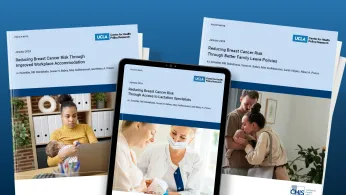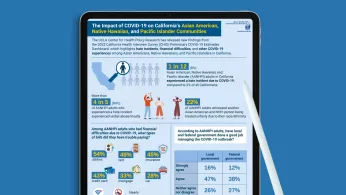This policy note presents authors’ findings on the perceived benefits of comprehensive family leave, lack of family leave policies as a barrier to breastfeeding, and recommendations for improving family leave policies.
This policy note presents authors’ findings on the perceived benefits of comprehensive family leave, lack of family leave policies as a barrier to breastfeeding, and recommendations for improving family leave policies.
Authors offer an example of an academic collaboration between the University of California Los Angeles, Center for Health Policy and Research and the University of Philippines, Manila, College of Public Health that sought to build an equitable partnership between research institutions.
Authors offer an example of an academic collaboration between the University of California Los Angeles, Center for Health Policy and Research and the University of Philippines, Manila, College of Public Health that sought to build an equitable partnership between research institutions.
Despite decades of research exposing health disparities between populations and communities in the U.S., health equity goals remain largely unfulfilled. Authors argue these failures call for applying an equity lens in the way data systems are approached, from collection and analysis to interpretation and distribution. Hence, health equity requires data equity.
Despite decades of research exposing health disparities between populations and communities in the U.S., health equity goals remain largely unfulfilled. Authors argue these failures call for applying an equity lens in the way data systems are approached, from collection and analysis to interpretation and distribution. Hence, health equity requires data equity.
Although revoked, the Trump Administration’s 2019 changes to the public charge rules contributed to avoidance of public programs among immigrants, even program-eligible immigrants, because immigrants believed access would affect their immigration status or that of a family member. Decreased participation in Medicaid and Supplemental Nutrition Assistance Program (SNAP) can negatively impact health and access to health care.
Although revoked, the Trump Administration’s 2019 changes to the public charge rules contributed to avoidance of public programs among immigrants, even program-eligible immigrants, because immigrants believed access would affect their immigration status or that of a family member. Decreased participation in Medicaid and Supplemental Nutrition Assistance Program (SNAP) can negatively impact health and access to health care.
This study describes reporting of an experience of race-based hate but not an experience of race-based unfair treatment among Asians in California and explores the association between this reporting discordance with 1) serious psychological distress, 2) forgoing needed medical care, 3) increased household interpersonal conflict, and 4) feeling unsafe in their neighborhood.
This study describes reporting of an experience of race-based hate but not an experience of race-based unfair treatment among Asians in California and explores the association between this reporting discordance with 1) serious psychological distress, 2) forgoing needed medical care, 3) increased household interpersonal conflict, and 4) feeling unsafe in their neighborhood.
Authors describe key issues under debate with regards to adverse childhood experiences (ACEs) screening and estimate potential change in screening utilization and expenditures due to the October 2021 ACEs legislation in California.
Authors describe key issues under debate with regards to adverse childhood experiences (ACEs) screening and estimate potential change in screening utilization and expenditures due to the October 2021 ACEs legislation in California.
A team of researchers examined the state of modern health and health care in California, the historical policy decisions and societal shifts that created the current situation, and trends influencing change in the existing health care environment. They focused on the seven topic areas: (1) health systems and public programs, (2) insurance coverage and markets, (3) environmental influences, (4) chronic conditions and mental health, (5) child and adolescent health, (6) aging residents, and (7) racial justice and immigrant populations.
A team of researchers examined the state of modern health and health care in California, the historical policy decisions and societal shifts that created the current situation, and trends influencing change in the existing health care environment. They focused on the seven topic areas: (1) health systems and public programs, (2) insurance coverage and markets, (3) environmental influences, (4) chronic conditions and mental health, (5) child and adolescent health, (6) aging residents, and (7) racial justice and immigrant populations.
Little data exists on the well-being of older adults from Asian American (AA) communities. Two well-being metrics — receiving needed social and emotional support and current life satisfaction — may help gauge levels of mental health among AA older adults.
Little data exists on the well-being of older adults from Asian American (AA) communities. Two well-being metrics — receiving needed social and emotional support and current life satisfaction — may help gauge levels of mental health among AA older adults.
The toll of COVID-19 on smaller communities within broad racial/ethnic categories has been exposed in media reports, memorials, and data collected by special interest groups. However, in many public-facing data systems, Native Hawaiian and Pacific Islander (NHPI) and Asian categories are grouped together or may not even be reported.
The toll of COVID-19 on smaller communities within broad racial/ethnic categories has been exposed in media reports, memorials, and data collected by special interest groups. However, in many public-facing data systems, Native Hawaiian and Pacific Islander (NHPI) and Asian categories are grouped together or may not even be reported.
This fact sheet presents findings from interviews, discussions, and studies from the report Barriers to Metastatic Breast Cancer Care in California: A report to the California Breast Cancer Research Program. Specifically, the fact sheet assesses barriers to accessing and enrolling in clinical trials and recommendations on policy solutions that could improve survivors’ understanding of and access to care options for breast cancer that has metastasized.
This fact sheet presents findings from interviews, discussions, and studies from the report Barriers to Metastatic Breast Cancer Care in California: A report to the California Breast Cancer Research Program. Specifically, the fact sheet assesses barriers to accessing and enrolling in clinical trials and recommendations on policy solutions that could improve survivors’ understanding of and access to care options for breast cancer that has metastasized.










